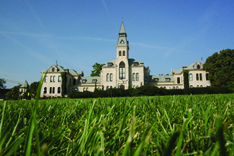Building a brighter future
Conference on sustainability aimed at collecting ideas, perspectives
 An effort to make Kansas State University not just a participant but a leader in the drive toward sustainable practices has created an on-campus conference scheduled for Jan. 23, 2009.
An effort to make Kansas State University not just a participant but a leader in the drive toward sustainable practices has created an on-campus conference scheduled for Jan. 23, 2009.
Organizers of the conference, titled "Leading Kansas in Sustainability," are evaluating proposals from government, education, commercial and nonprofit entities for presentations and poster sessions at the inaugural conference. Final selections should be made by the end of October.
Ben Champion, the university's director of sustainability, hopes the event will help build "a community of interest" about sustainability at K-State. "That means catalyzing interest across departments, colleges, curriculum, research – all across campus.
"We really want to showcase what Kansas State is doing, and to prove to ourselves that we have the capacity to be a force for change," he said.
Spreading the latest tactics and research on green issues is a logical outgrowth of K-State's traditional mission as a land-grant institution, Champion said.
Though the conference has the structure of a traditional academic conference -- papers and presentations by experts on a predetermined range of topics -- Champion wants students and people from all walks of life to take part.
For a keynote speaker, conference organizers hope to attract David Orr, chair of the environmental studies program at Oberlin College in Ohio.
"Orr is a real leader and an intellectual force on issues of sustainability," Champion said.
The range of conference issues is intentionally broad, because virtually all aspects of human activity affect the environment, and vice versa.
Topics will range from the concerns of academic research and university operations to rural population loss, soil and water conservation, and potential economic models of green development across the state.
"Our society has a lot to confront in coming to terms with sustainability," Champion said. "We need to think carefully and seriously about what that means for K-State and the state as a whole."
Conference sessions consist of the following tracks:
* Energy: Presentations will identify the long-term prospects and changes needed in supply, efficiency and demand appropriate to sustain quality of life in Kansas. Speakers will represent consumers and producers of energy.
* Rural sustainability: Prospects for continued decline, stabilization or reversal of population loss are central to the sustainability of the state. Community scale, the role of technology, governance and infrastructure all determine what is sustainable on the Kansas prairie.
* Water and soil: This track will focus on natural resources in Kansas, their quality and distribution.
* Economic development and the emerging green economy: The challenges of developing such an economic base include reforms of existing industries as well as development of new economic models and organizations. Topics in this session could focus on investments by renewable energy companies, the role of small grocery cooperatives, and tensions between sustainable agriculture and resource-intensive conventional methods.
For more information go to http://sustainability.k-state.edu/conferences/leadingkansas/